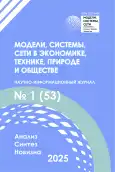SOFT CONTROL OF A NON-LINEAR ECONOMIC SYSTEM
- Authors: Trundaev I.V.1
-
Affiliations:
- Financial University under the Government of the Russian Federation
- Issue: No 1 (2025)
- Pages: 84-100
- Section: MODELS, SYSTEMS, MECHANISMS IN THE TECHNIQUE
- URL: https://journal-vniispk.ru/2227-8486/article/view/291972
- DOI: https://doi.org/10.21685/2227-8486-2025-1-7
- ID: 291972
Cite item
Full Text
Abstract
Background. The paper considers the problem of managing an economic system represented by a nonlinear model under conditions of uncertainty. Materials and methods. The economic system is described by a nonlinear model that includes a random factor and a controlling influence from the state. Within the framework of this model, expert knowledge-based management algorithms are built to ensure balanced and sustainable development. Results. A study of the proposed dynamic model describing cycles in the economy and a comparative analysis of the control algorithm using precise and fuzzy control algorithms are carried out. Conclusions. Certain advantages of the proposed fuzzy control algorithm for a nonlinear model based on expert knowledge are highlighted, which can be useful in developing control systems of higher dimension, where the use of classical methods may not be sufficiently justified or appropriate.
About the authors
Ivan V. Trundaev
Financial University under the Government of the Russian Federation
Author for correspondence.
Email: ivan_t98@mail.ru
Postgraduate student of the sub-department of mathematics and data analysis
(49/2 Leningradsky avenue, Moscow, Russia)References
- Cafferata A., Dávila-Fernández M.J., Sordi S. (Ir) rational explorers in the financial jungle: Modelling Minsky with heterogeneous agents. Journal of Evolutionary Economics. 2021;31(4):1157–1188.
- Berger T., Hienzsch S. Which Global Cycle? A Stochastic Factor Selection Approach for Global Macro-Financial Cycles. Studies in Nonlinear Dynamics & Econometrics. 2024. doi: 10.1515/snde-2023-0093
- Kang D.N., Marmer V. Modeling long cycles. Journal of Econometrics. 2024; 242(1):105751.
- Neck R., Blueschke D., Blueschke-Nikolaeva V. Optimal fiscal policy in times of uncertainty: a stochastic control approach. Empirica. 2024:1–22.
- Yakovenko I. Fuzzy stochastic automation model for decision support in the process inter-budgetary regulation. Mathematics. 2020;9(1):67.
- Xie X., Chen Y.H. Robust control design for an uncertain macroeconomic dynamical system with unknown characteristics and inequality control constraint. Complexity. 2021;2021(1):8826480.
- Goodwin R.M. A Growth Cycle: Socialism, Capitalism and Economic Growth. Essays in economic dynamics. London: Palgrave Macmillan UK, 1967:165–170.
- Jin Z., Liu G., Yang H. Optimal consumption and investment strategies with liquidity risk and lifetime uncertainty for Markov regime-switching jump diffusion models. European Journal of Operational Research. 2020;280(3):1130–1143.
- Avramov D. et al. Sustainable investing with ESG rating uncertainty. Journal of financial economics. 2022;145(2):642–664.
- Alfaro I., Bloom N., Lin X. The finance uncertainty multiplier. Journal of Political Economy. 2024;132(2):577–615.
- Drautzburg T., Fernández-Villaverde J., Guerron-Quintana P. Politics and Income Distribution. Economic Insights. 2022;7(2):11–18.
- Paraje G. et al. The effects of the Chilean food policy package on aggregate employment and real wages. Food Policy. 2021;100:102016.
- Keynes J.M. The general theory of employment. The quarterly journal of economics. 1937;51(2):209–223.
- Arnol'd V.I. «Zhestkie» i «myagkie» matematicheskie modeli = "Hard" and "soft" mathematical models. Moscow: MTsNMO, 2004:32. (In Russ.)
- Pegat A. Nechetkoe modelirovanie i upravlenie = Fuzzy modeling and control. Moscow: BINOM. Laboratoriya znaniy, 2013:798. (In Russ.)
- Materialy dlya lektsiy po kursu AIML = Materials for lectures on the AIML course. (In Russ.). Available at: https://github.com/air-labs/AIML (accessed 01.10.2024).
Supplementary files





















